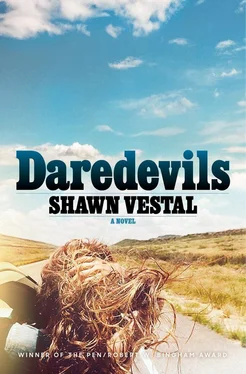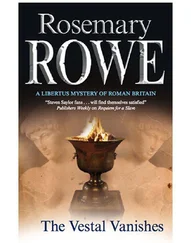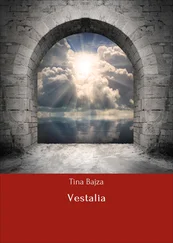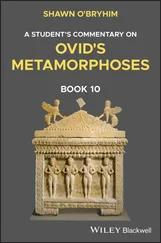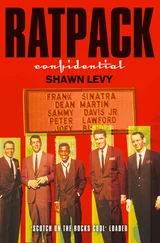So much time and effort and fuckery precedes the moment. Any moment. Each one is so frail, so pushed along the tracks by everything that came before, everything you promised, everything you feared. We started talking canyon jump before we ever jumped a thing. It was in us, this faith. First it was the Grand Canyon we would jump, and then it became the Snake River, and then time pushed us down those tracks and pushed the canyon jump from a thing said to a thing said often to a pledge and then a promise. Time warped it. Turned it real. The steel and the rivets and the steam engine and the leases and the newspaper boys and the things we said, the things we said fueling it, the things we said and the rocket and the parachute and the marching band and the things we said, the prayer in them, the calling forth of them, the things we said entering the air as sound and sign, gathering atoms and molecules and simple fucking weight, America, gathering power, gathering heft, gathering mass, until they become true things, freestanding and undeniable, made into a vessel to carry us forward, a bullet — a train a bullet a star-spangled rocket ship a whatever the fuck, a universal torque impervious to physics and the boundaries of glory.
That was where we sat that afternoon. On the tip of that bullet. September 8, 1974. We walked through those throngs, touched those people, and saw all that we had done to them. We rose to the ramp on a throne, and they roared. We thought of Caesar and Kennedy, of Alexander the Great. We thought of ascension. We believed in the bullet of the moment, the pressure of the instant, the nobility that must live in us, that must, because we saw all it had grown into, what we said, we saw all that what we said had become, and they saw it, too, these people, and they came to worship.
And then we put our foot into the cockpit, and felt the heel of our boot drum on the tinny bottom of the Skycycle.
And we knew.
Boyd
Never in a million years, Boyd thinks, would anyone have guessed Harder could pull this off. An hour ago, even, as he waited at home, one duffel bag packed, praying his mom didn’t come home early from the Lincoln Inn, even then, Boyd never imagined they would really leave. Never imagined that Harder — good boy and Eagle Scout, who whispered when he cussed and flinched when you fake-punched him — would dredge up the balls for it.
But here they are. Going, going, gone. They are crossing midnight as they pass slowly through Wendell in the big LeBaron, and Jason sticks to the speed limit as they pass under the sign in the middle of town — THE HUB OF THE MAGIC VALLEY — past hotel, grocery store, bar, grain elevator, and onto I-84.
Jason drives, Loretta rides shotgun, Boyd’s in back. Honestly, Boyd doesn’t see what the big deal is. Skinny brown-haired chick. Bet she can bake like a grandma already. He’s thrilled to be going, but baffled at Harder, his oldest friend and still a mystery: baffled that he’s done this and why. Running away from his rich life. Jason took this car from his parents, though it was sort of his car, he drove it all the time, the 197 °Chrysler Imperial LeBaron. Pea green with a black top, it slides over the road on soft shocks and pulls hard around corners. A land ship. The stitched seats are wide and deep, and the speedometer spreads across the dashboard, needle moored at the top so it swings upside down through the miles per hour. The all-or-nothing heater blasts noisily, and the new eight-track player hangs under the dash. They clear Wendell with a silence building in the cab, a tension inside of that silence because none of them knows how to be together. Jason begins to speed up as he approaches I-84, engine straining, and the upside-down needle ticks past fifty, past sixty, and the LeBaron settles into its speed now, they enter the freeway, and it feels to Boyd as if they have left the earth and are flying.
Loretta says, “Who wants pie?”
Runaways, Boyd thinks. That’s what they’ll call us. How soon? Will his mother discover he’s gone before morning? Will the radio put out bulletins? Will the newspaper run their photos? Runaways . It’s hard to see through this toward any kind of ending, but for now, he has become something he was not before, and it will always be cool.
“Shit yeah, I want pie,” he says.
Jason is quiet at the wheel. He drives and drives. Boyd thinks, Don’t pussy out on us, Harder . Loretta leans forward and withdraws a foil-covered pie from the bag between her feet, and fusses with it on her lap for a second, and then hands back a piece of pie with a bloody mass spilling out the sides.
“Rhubarb,” she says, smiling at him crookedly, squintingly, mischievous.
“Ugh. Okay.”
“Don’t do me any favors,” she says, turning back to the pie. “Jason?”
Boyd says, “Rhubarb’s one of those things — like, who do you think first decided to put that in a pie? It’s like smoking. Who did that first? And then, after doing it just once, why’d they keep doing it? I mean, I understand what happens if you smoke fifty times and get used to it or something, and then you like it or can’t stop or something? But that first guy who smoked? Why’d he keep smoking?”
“I’ll have some pie, thanks,” Jason says.
“And that first guy who made rhubarb pie? Why’d he keep making it?” Boyd says.
The pie feels heavy in Boyd’s hand, like a dead thing. Loretta hands a wedge on a napkin to Jason, a wet bud of tongue peeking from the corner of her mouth.
“Ruth’s rhubarb pie,” she says triumphantly. “She’s going to be so pissed.”
Jason takes a bite and groans. Loretta reaches across and wipes a gelatinous smear from his chin, as if he were a toddler. Boyd takes a bite himself, and his mouth contracts: it is as sour as a lemon.
“Holy shit,” he mumbles, as he rolls down the window. He spits the mouthful into the rushing winter air, and a gelatinous mess schlumps along the side of the car. “Is that pie a joke?”
Loretta doesn’t answer. She holds a third piece of pie in her hands and looks at it, lost in thought. Then she says, dreamily, “That’s how she makes it.”
She rolls down the window and gives the pie an underhand toss into the icy night. Brisk air rushes in, and Boyd throws his out, too. Jason hands his piece to Loretta, and she tosses it out as well, then picks up the pie tin from the LeBaron’s floor and holds it in both hands, like she’s gripping a steering wheel. She turns sideways and sticks the pie out the window with both hands, preparing to lob it into the night.
“Do it,” Boyd says. “Yes.”
She waits, waits, and an exit sign emerges on the road ahead: TWIN FALLS 1. She lobs the pie gently into the air — an expert move, Boyd thinks, the move of someone who understands the physics of throwing something at a road sign from a moving vehicle. It clangs thinly, leaving a Doppler wobble in their wake. Boyd whoops like a cowboy, and Loretta grins thinly as she settles back in. And what is Jason doing up there, so quiet? Is he regretting this? Being scared?
He better not fuck this up.
• • •
They turn off at Twin, drive across the bridge. Thin patches of cloud stretch across the stars. It is not much past one, but even the lights ahead can’t erase the feeling of an emptied world. Boyd waits for Jason to say something about Evel Knievel, about the ramp over there on the canyon rim, silhouetted, but he miraculously doesn’t. Loretta turns the radio knob, staticky AM blaring and fading, and stops on a preacher, calling to them from out of the darkness in a gentle Southern baritone.
“‘I looked when He opened the sixth seal, and behold, there was a great earthquake; and the sun became black as sackcloth of hair, and the moon became like blood.’”
Читать дальше
